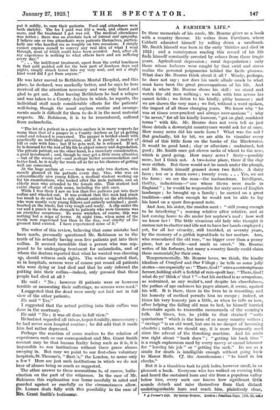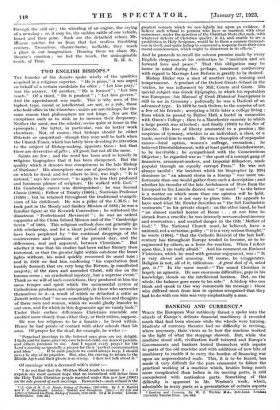A FARMER'S LIFE.* IN these memorials of his uncle, Mr.
Bourne gives us a book with a country flavour. He writes from Farnham, where Cobbett educated himself by rolling down a sandbank. Mr, Smith himself was born in the early 'thirties and died in
1015 ; and a countryman reading this record of his life
Anas himself constantly arrested by echoes from those tragic years. Agricultural depression ; rural depopulation ; only those whose forbears were caught by that swirl and stress realize the personal poignancies behind the facile phrases. What does Mr. Bourne think about it all ? Wisely, perhaps, he does not say ; nor does his uncle allude much to what must have been the great preoccupations of his life. And that is where Mr. Bourne shows his skill : we stand and- watch the old man milking ; we walk with him across his sunset fields ; we listen to his kindly, pithy humour ; and we are shown the very man ; we feel, without a word spoken, the impact of all those changing years. We know why " he was at times over-prudent and always over-anxious " ; why "he never," for all his kindly humour, "got on glad, confident terms " with life. Mr. Bourne does not even tell us just those details a downright countryman would ask for at once. How many acres did his uncle farm ? What was the soil ? But gradually, bit by bit, we are able to visualize every detail of this little farm on the banks of the Blackwater. It would be good land ; clay or alluvium ; undrained, but good ; Mr. Smith once got eleven sacks of wheat to the acre, which is good going. How many acres ? Sixty—possibly more, but I think not. A two-horse place, three if the clay were stiffish. But there would not be much under the plough, and Mr. Smith himself grassed down two fields. A dairy farm ; ten or a dozen cows ; twenty even. . . . Yes, we see the farm ; we see the man—the husbandman. Intelligent, thrifty, industrious—" one whose thews were made in England " ; he would be responsible for sixty acres of English landscape ; he brought up a family ; he carried on a great tradition—and often enough he would not be able to lay his hand on a spare five-pound note.
And Ann, his sister, the maiden aunt : " still young enough to be interfering" ; nursing relative after relative, and at last coming home to die under her nephew's roof : how well we know her The little vivacious old lady who thought it morose not to chatter and idle not to have her hands employed ; yet, for all her vivacity, still troubled, at seventy years, by the memory of a girlish ingratitude to her mother. Ann, who remembered the old rose, " no bigger over than a penny piece, but as double—and smelt so sweet." Mr. Bourne writes of his forbears, but many a country family could claim these memorials:for their own.
Temperamentally, Mr. Bourne loves, we think, the kindly
idealism of Cranford and Our Village ; he tells us some jolly stories one especially so : "There, God !" cries a contemptuous farmer, holding aloft a forkful of rain-spoilt hay. " There, God l what do yo' think o' that ? "—but his method is as scrupulous, as restrained, as any realist's, and despite his cheerfulness, the pathos of age cadences his pages almost, it seems, against his will. It is there, there in the lives he is recording, and his honesty of method permits him no escape ; indeed, at times his very honesty jars a little, as when he tells us how, after helping the failing old man to bed, he himself hurried downstairs again to transcribe memoranda of the evening's talk. At times, too, he yields to that strained " anti- quarianism " which is the bane of so many country writers ; " cavings " is an old word, but one in no danger of becoming obsolete ; rather, we should say, it is more frequently used since the advent of the threshing machine. And his uncle was right about " back days " ; " getting his back time " is a rough euphemism used by every navvy or casual labourer for " leaving his job " or " getting the sack." Its use as a simile for death is intelligible enough without going back to Manor Rolls. Cf. the Americanism : " to hand in his checks."
But it is a thankless task to pick holes, however small, in so pleasant a book. Everyone who has walked on evening hills and heard the sustained hum and stir from a populous valley below him, every such one knows how significant little sounds detach and raise themselves. from that distant undistinguishable hum and reach him, plaintively clear,
Farmer's Life. By George Bourne, London Jonathan Cape, (105, Od, naki through the still air ; the whistling of an engine, the crying of a newsboy ; or, it may be, the sudden rattle of one vehicle, heard and then gone. Such are the detached echoes Mr. dourne catches for us from that last restless throbbing century. Tremulous, chance-borne, ineffable, they reach a place in our imagination. Hearing them we share Mr. Bourne's emotion ; we feel the touch, the unimaginable











































 Previous page
Previous page